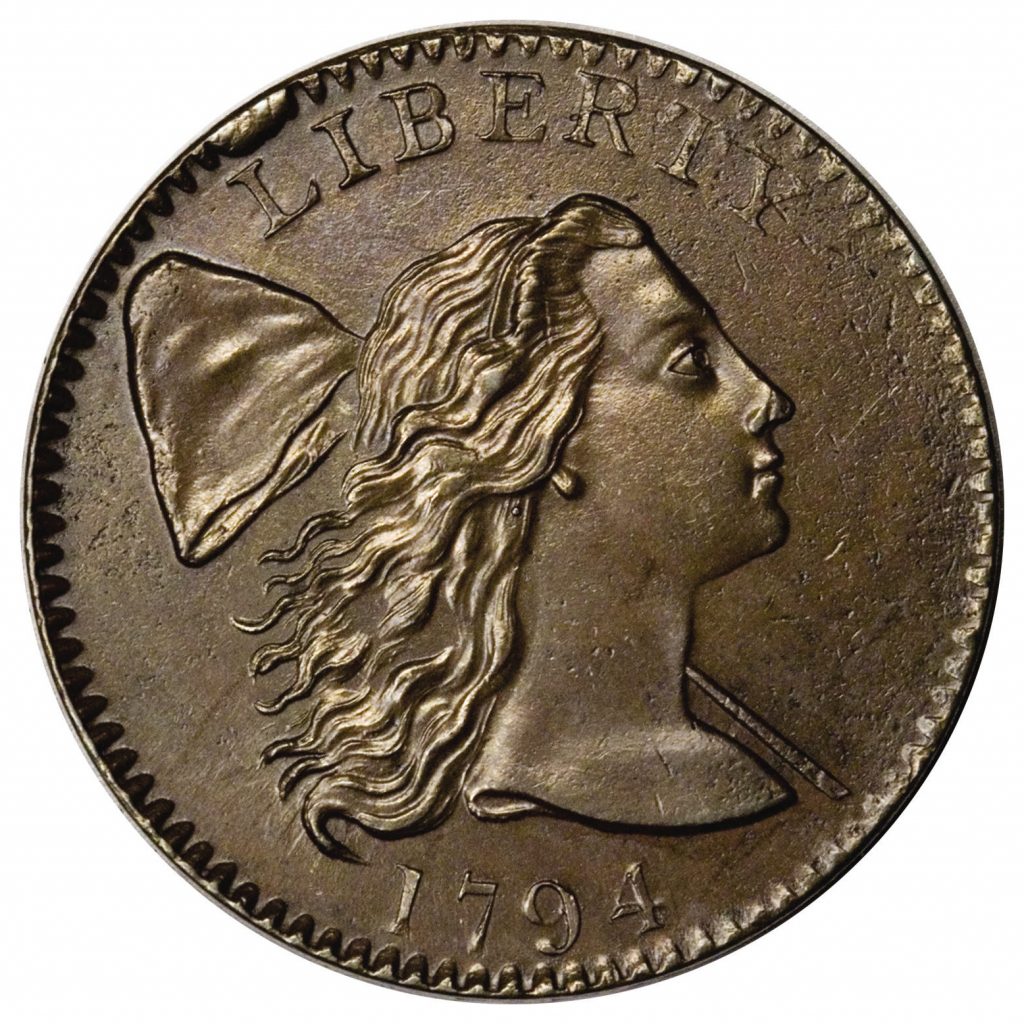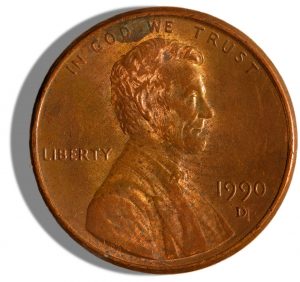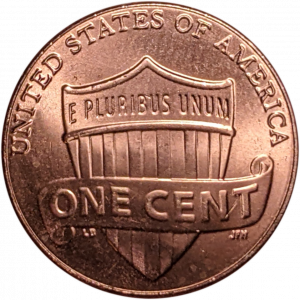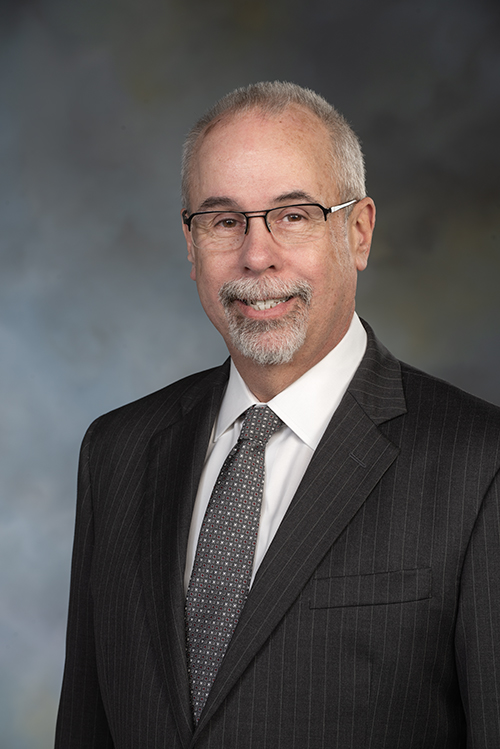When the United States Mint was established in 1792, one of the first coins produced was the one-cent piece. Prior to the U.S. establishing its own currency, American colonists would use a mixture of coins from other countries for trade, with the British penny being the most popular. Hence, when the U.S. government began issuing its own currency, the common one-cent piece inherited the nickname “penny” from its British counterpart.
The first one-cent coin was designed by Benjamin Franklin and featured on its obverse (heads) side the image of a lady with flowing hair representing Liberty. Her design changed a few times over the years, with her flowing hair eventually being wrapped up in braids starting in 1808, when she started being portrayed wearing a Liberty headband. This design would last until 1857, when it would be replaced by the smaller Flying Eagle cent.



The original penny was nearly 50% larger than the modern one-cent piece and made from pure copper, making it more than five times as heavy as the modern penny. The so-called large cent was about the size of a modern half-dollar piece. The penny was shrunk nearer to its current size with the Flying Eagle cent in 1857, which would then be replaced by the Indian Head cent in 1859.
 The Lincoln cent was adopted in 1909 on what would have been Abraham Lincoln’s 100th birthday. Lincoln was the first figure from American history to have their likeness grace a piece of U.S. currency, which was the result of a wave of public sentiment stemming from the anniversary of the former President’s birth. This was also the first piece of U.S. currency to feature the motto “In God We Trust.”
The Lincoln cent was adopted in 1909 on what would have been Abraham Lincoln’s 100th birthday. Lincoln was the first figure from American history to have their likeness grace a piece of U.S. currency, which was the result of a wave of public sentiment stemming from the anniversary of the former President’s birth. This was also the first piece of U.S. currency to feature the motto “In God We Trust.”
Lincoln’s likeness as featured on the penny is actually based on the work of a Lithuanian-born Jew named Victor David Brennar who had made a bas-relief of Lincoln based on an old photograph. The relief had caught the attention of then-president Theodore Roosevelt. In some older coins, Brennar’s initials can be found on the rim of Lincoln’s bust.
Modern pennies are copper-plated zinc, which is both lighter and cheaper. The use of zinc in the minting of one-cent pieces began at the peak of World War II, when the demand for copper to be used in munitions meant that an alternative had to be found for minting currency. From World War II until 1982, pennies were 95% copper and 5% zinc. This changed again in 1982 because the value of the copper used to mint a penny had risen above the value of the currency itself, leading to the modern composition of 97.5% zinc and 2.5% copper.
 The modern Lincoln cent was redesigned in 2009, in honor of the bicentennial of Lincoln’s birth. This design did away with the Lincoln memorial on the reverse side of the coin in favor of a shield bearing the motto of the United States, E Pluribus Unum. There were also four special reverse-face designs minted in limited quantities for Lincoln’s bicentennial, each depicting a scene from Lincoln’s life.
The modern Lincoln cent was redesigned in 2009, in honor of the bicentennial of Lincoln’s birth. This design did away with the Lincoln memorial on the reverse side of the coin in favor of a shield bearing the motto of the United States, E Pluribus Unum. There were also four special reverse-face designs minted in limited quantities for Lincoln’s bicentennial, each depicting a scene from Lincoln’s life.
I hope you enjoyed learning about the origins, designs, and transformation of the U.S. penny since the founding of our country, and I hope you think a bit more about these inconspicuous pieces of currency the next time you feel them jingling around in your pocket.
 Kayla Schnellman is the Assistant Branch Manager for our Claussville Office. She has worked for New Tripoli Bank for over five years, where she has worked as Community Banker, Customer Service Representative, and Head Teller. When she's not working, she enjoys spending time with friends and with her three dogs.
Kayla Schnellman is the Assistant Branch Manager for our Claussville Office. She has worked for New Tripoli Bank for over five years, where she has worked as Community Banker, Customer Service Representative, and Head Teller. When she's not working, she enjoys spending time with friends and with her three dogs.
By Tanya Hausman

Have you ever been cleaning your office when you find a forgotten bill hidden underneath a stack of papers? Maybe you recently received an overdraft notice because you weren’t paying attention to your account balances? Whatever the case, being financially fit isn’t just about getting better with saving and spending money; something as simple as staying organized can help you maintain a healthy financial life.
Organization can be applied to all aspects of your life, but it can be especially helpful for those of us who are trying to get smarter with our money habits. Here are some good rules of thumb for staying organized to improve your financial fitness.
Stick to a routine. If you’re the kind of person who is prone to distraction, it can be helpful to set a time of day dedicated to a particular important activity, whether that’s cleaning your house or paying your bills. Maybe you collect your bills when you come home from work and spend the first few minutes of your evening paying them online, or maybe it’s easier for you to wait until the following day and schedule the payments first thing in the morning.
The longer you repeat an action, the less thought it takes to do that action each time. A lot of the time we become disorganized while trying to avoid the amount of mental or physical strain of a particular activity. What’s important is to not let interruptions in your routine stop you from sticking to it.
Automate your tasks whenever possible. When a routine simply won’t cut it, there are online tools you can use to make organizing your life easier. New Tripoli Bank offers automatic bill pay tools that allow you to pay recurring bills each month. When you set up monthly bills to be paid automatically from your checking account, it reduces the stress that comes from worrying about late fees. You can always start off small with one or two bills until you get a handle on it.
Keep your bills, invoices, and receipts in one place. Purchase an expanding folder or a file cabinet that you can dedicate to filing your monthly bills, invoices for work, and documents you need for tax purposes. Ideally you will keep them near your desk or wherever you normally write checks or pay bills online. Decide on a filing system so you can easily find a bill from a specific company. If you plan to use a physical filing system, make sure you print out electronic bills so you will have them in the same place.
Some people prefer to store their records online and shred any paper documents that arrive through the mail. If you want to organize your bills electronically, scan every bill you receive in the mail and keep them filed in the same place as the rest of your documents. Having a mix of digital and physical records defeats the purpose of organization. No matter which way you choose, make sure you have a filing system that makes it easy to locate specific documents at a later date.
Create a budget and track your spending. You should always be aware of where your money goes and how your spending fluctuates throughout the year. Most homeowners know that their electric bills increase in the summer months when they’re constantly running the air conditioning. Keeping a log of your spending will help you streamline your budget and identify areas where you can cut back.
It’s important to leave yourself reminders for bills that occur once a year, such as property taxes or the bill for filling your oil tank. Keeping a checklist of expected bills will prevent you from being surprised by sudden expenses that may throw your monthly budget out of order.
Learn how to prioritize your obligations. Whether it’s planning your budget or organizing your bills, you need to categorize so you give the proper amount of attention to the things that are most important. When budgeting, you should allocate money for necessities such as bills, food, and utilities before worrying about things like entertainment, donations, and savings. If you find yourself with a mountain of bills, prioritize paying them off in order of due date.
Implementing these tips can help relieve the amount of stress you feel when thinking about personal finances. By creating a daily routine, using tools that can automate processes, organizing your bills into one place, reducing clutter, creating a budget, keeping on top of your spending, and prioritizing your obligations, those financial goals that seem hopelessly out of reach start to seem a lot more achievable.
Looking to improve your financial fitness? Contact your local New Tripoli Bank branch to speak with one of our helpful community bankers and learn how our products can help you achieve your financial goals.
 Tanya Hausman is a Senior Deposit Operations Specialist with New Tripoli Bank. She has been a member of the New Tripoli Bank team for the past ten years and when not working she likes to spend her time raising her two wonderful children and practicing her crafting hobby with her Cricut machine.
Tanya Hausman is a Senior Deposit Operations Specialist with New Tripoli Bank. She has been a member of the New Tripoli Bank team for the past ten years and when not working she likes to spend her time raising her two wonderful children and practicing her crafting hobby with her Cricut machine.

Your credit score is a prediction of your credit behavior, such as the likelihood of you paying back a loan on time, based on information from your credit reports. Companies use your credit score to decide whether to offer you a mortgage, credit cards, auto loans, and other credit products, and landlords use credit scores to screen tenants. The interest rate you receive on credit products is also influenced by your credit score.
When you have a low credit score, it can feel impossible to pull yourself out of the hole. Though it can take several months to see an improvement on your credit score, there are a number of quick, simple things you can start to do to help boost your credit score.
Review Your Credit Reports
Before you work on improving your credit, it’s important to know how you arrived at your current credit score. You can do this by pulling your credit report from the three major national credit bureaus—Equifax, Experian, and TransUnion—and reviewing reports for indicators of what is negatively impacting your score.
Be on the lookout for things like sustained high credit card balances, repeated missed or late payments, collections, and judgments. All of these can detract from your overall credit score. You should also be wary to not pull your credit report too often, as doing so can negatively impact your score. You are entitled to one free copy of your credit report from all three credit bureaus once per year, which can be accessed at www.AnnualCreditReport.com. You can also obtain free weekly credit reports from the website which show your credit history without your score.

Organize Your Bill Payments
Your payment history has a massive impact on your credit score. That’s why it’s important to develop a system for paying your debts on time. New Tripoli Bank offers Automated Bill Payment through our online banking service that makes paying down these monthly debts much easier.
Create a record of your monthly bills, either in paper or digital, and set reminders for yourself so you know when your next payment is coming up.
If you are comfortable doing so, consider charging your monthly bills to a credit card, while making sure you pay the card’s balance in full each month to avoid interest charges. The benefits are twofold: you consolidate your bill payments into a single monthly credit card payment, and you boost your credit score as long as you keep up with those monthly payments.
Keep Your Credit Utilization Low
Credit utilization is the portion of your available credit that you use at any given time and is another important factor in how your credit score is calculated. While your best option is to pay your credit balance in full each month, if you are unable to do this, you should set a hard limit for how much of your available balance you can leave outstanding each month. 30% is the recommended amount to start improving your credit score, and each month you should work on reducing this percentage to further increase your score.

Limit Requests for New Credit
When you apply for a credit card, loan, or other credit product, the company offering the product will pull your credit report in order to gauge your creditworthiness. If this only happens occasionally, it won’t have much effect on your creditworthiness, but if you are repeatedly applying for new credit in a short period of time, it can damage your credit score.
Not all credit report inquiries will affect your score. So-called “soft inquiries” include an employer checking your credit, routine checks by financial institutions with whom you already do business, and companies checking your credit in order to send pre-approved credit offers. If you are working on improving your credit score, it is best to avoid applying for new credit in general.
Consolidate Debts
If you have a number of outstanding debts, it can be advantageous to take out a debt consolidation loan from a bank in order to pay off older debts. This leaves you with a single payment and the possibility of a lower interest rate on the loan, which puts you in a better position to pay down your debt faster and improve your credit utilization ratio.
There is no set amount of time that it takes to improve your credit score. How long it will take depends on the specifics of why your credit score is low and your financial capability to get a handle on your credit situation. Improving your credit score can take several weeks or months before you see a noticeable impact on your score. The important part is to take those first steps to a healthier financial future. If you’re looking for help getting started, you can reach out to New Tripoli Bank, which offers products and services tailored to your needs.

Kate Hart-Zayaitz is New Tripoli Bank's Chief Lending Officer and Senior Vice President. Kate has spent many years working for various community banks in our area. She was born and raised in Emmaus and has been involved with multiple banking and economic organizations throughout the Lehigh Valley.
There's no such thing as a free lunch, and there's no such thing as a "free" security scan for your computer. You may have been browsing the internet in the past and seen a pop-up or ad for a "free" scan to find malware on your computer. Some of these ads might even have official-looking logos like the Windows logo to make them appear more legitimate. Don't fall for it! These are scammers impersonating well-known companies and using scare tactics to trick you into paying to fix computer problems that may not even exist.
Here's how the scam works: you will receive a pop-up informing you that there are viruses or other malicious software on your computer and will include a link for a free scan. Following the "scan," the scammer will contact you saying that they have identified supposed "serious issues" that require your immediate attention, then urge you purchase software that can "fix" these alleged problems. After you've purchased and installed the software—which can range anywhere from $25 to $60—you are provided with a number to call to "activate" the software. When you call this number, you're greeted by a telemarketer who will try to sell you additional services by claiming the "problems" on your computer are more severe than their software can handle.
There are simple steps you can take to avoid these types of scams:
- Don't click on links in pop-ups or other ads you encounter on the internet. If you see a product or service that interests you, search for it via Google or other search engine to find out if it is legitimate.
- Your computer can't be scanned by pop-up ads. If an ad on a website says its found problems on your computer, this is an obvious scam. Do not click the link, even if it has a logo you recognize like a Windows or Microsoft logo!
- Know that legitimate tech companies won't contact you by phone, email or text message to tell you there's a problem with your computer.
- Take the time to research anyone pressuring you into buying a product or service online.
You can learn more about this and other tech support scams at ftc.gov/techsupportscams.
Mail check fraud continues to be a serious problem facing consumers and banks and combatting this epidemic of fraud is a top priority for the security team here at New Tripoli Bank. This type of fraud occurs when someone steals uncashed checks, either from personal or Post Office mail boxes (i.e. the blue mailboxes), then "washes" the checks and alters them to cash out themselves or sells uncashed checks online. This leaves the person who wrote the check paying someone who is not the intended recipient.
New Tripoli Bank has put together a helpful infographic to help our customers who have been targeted by mail check fraud, which you can view here: https://www.newtripolibank.net/wp-content/uploads/2024/04/1709237178-AlteredChecksHandout.pdf
What should you do when you fall victim to this type of fraud? Don’t beat yourself up! Anyone can fall victim to fraud and you shouldn’t feel stupid for being targeted by criminals. New Tripoli Bank is ready to help ensure your money and identity are kept safe from scammers.
- Contact your bank and alert them that your personal financial information has been stolen.
- Create a list of outstanding checks or any regular incoming or outgoing payments. You will need this information when you open a new account.
- Visit your bank to close old accounts. New Tripoli Bank customer service representatives are trained to help customers close accounts that have been targeted by fraud and open new ones.
- File a police report with your local police department.
- Go to USPS.com to report stolen mail to the United States Postal Service or contact the U.S. Postal Inspector’s Office by calling 1-877-876-2455.
Where can I file complaints?

Consumer Financial Protection Bureau (CFPB)
Complaints can be filed with the CFPB at www.consumerfinance.gov/complaint/
The CFPB hears complaints about deposit accounts, credit cards, debt collection, and more.
You will be asked for dates, dollar amounts, and communications relevant to your complaint. You are allowed to attach documentation to prove your case.

Federal Reserve Board (FRB)
Complaints about financial institutions can be filed with the FRB at https://forms.federalreserveconsumerhelp.gov/secure/complaint/formComplaintIntro.html
You will be asked for identifying information, information on the financial institution you are reporting, and an explanation of how you feel your issue can be resolved.

Federal Trade Commission (FTC)
You can report scams to the FTC at https://reportfraud.ftc.gov/
You will be asked to provide information including how much money the scammer was paid, how the money was sent, the dates when money was sent, and how you were contacted.
In honor of Black History Month, we thought it would be pertinent to highlight the many milestones that African Americans have achieved in finance and banking. Ever since emancipation, African Americans have played a significant role in the development of our modern financial and banking institutions. It is our sincere hope that these stories of influential figures in Black history can help inspire you.
The Freedmen’s Savings and Trust Company was a savings bank chartered by the United States’ Congress in 1865 to collect deposits from newly emancipated communities. It opened 37 branches across 17 states and Washington D.C., collecting funds from more than 67,000 depositors across the country. Unfortunately, the bank’s rapid growth was mired by mismanagement and fraud, weighed down by speculative loans issues by the bank’s White officials, and would eventually fail in 1874.
Blanche Kelso Bruce was the second African American to be elected to the U.S. Senate and the first to serve a full term. Born a slave to a plantation in Virginia, he is best remembered for his investigation of the collapse of the Freedmen’s Savings and Trust Company. He would later become the first Black Register of the Treasury and the first African American to appear on U.S. Currency in 1879.
The same year that Bruce first appeared on U.S. Currency, the first bank founded by African Americans opened in Washington D.C. The Capital Savings Bank provided capital to Black-owned businesses, to whom many White-owned banks were unwilling to lend. Just four years after it opened, the bank’s deposits had grown to well over $300,000. The Bank continued to operate under African American leadership and within Black communities until it closed in 1902.
Between 1888 and 1934, 134 Black-owned banks were formed to help Black communities overcome financial hurdles, not only by providing capital and credit but also offering training and employment. One of the greatest successes of African Americans in the financial sector was in the Greenwood District of Tulsa, Oklahoma, also known as Black Wall Street. Greenwood had become one of the most prosperous Black communities in all of America. Tragically, the neighborhood was destroyed by white supremacists during race riots in 1921.
In the early 20th century, many former slaves made names for themselves in the financial services industry. Alonzo Herndon was one such former slave, founding the Atlanta Life Insurance Company after working his way up from slave to barber to the owner of several barbershops, before eventually opening what is still one of the largest Black financial institutions in the United States, as well as becoming Atlanta’s first African American millionaire.
While not a slave herself, Maggie Lena Walker was the daughter of former slaves who would grow up to become the first African-American woman to charter a bank. The St. Luke Penny Savings Bank was designed by a Black architect and was one of few banks at the time whose board included a high percentage of women. Walker would go on to serve as the Bank’s president for several years.
Another former slave was Major R.R. Wright who, along with 70 other Black bankers, founded the first professional organization of African Americans in finance in 1927, an organization which still operates today as the National Bankers Association and focuses on providing financial support for underserved minority communities.
Following the Civil Rights Movement of the late 60s and early 70s, African Americans became much more represented across all financial sectors. In 1970, Joseph L. Searles became the first African American to do business on the floor of the New York Stock Exchange. Azie Taylor Morton was the first African American woman to have her signature on U.S. Currency when she was appointed by President Jimmy Carter to serve as the 36th Treasurer of the United States. In 1993, Harry Alford and Kay Debow founded the National Black Chamber of Commerce, which today is the largest Black business organization in the world, with regional chapters in the United States, Africa, the Caribbean, Central and South America, London and Paris.
We hope this extremely brief history of the role African Americans have played in the banking and financial services industry has been both entertaining and informative. It is a history of great struggle that highlights the hurdles minorities have had to overcome in order to achieve some level of success in today’s society. Hopefully, we will continue to work toward equity and equality in the future, not just in our industry, but across all parts of our society.
We have recently been alerted to a new scam affecting consumers in our area that is a spin on classic phone phishing tactics. Here's the way the scam works:
You are contacted by someone posing as an employee of your financial institution or some other business with whom you have an account. The caller claims that your account has been hacked and asks you to type a series of numbers into the phone during the call. After entering the numbers, the call ends and you are suddenly unable to use your phone!
The way this works is the scammer will ask you to input the code *72 and a 10-digit phone number. When you input this into your phone and hit call, it automatically forwards all future calls to the 10-digit phone number you input after the *72. With your phone forwarding calls, the scammer is now free to commit fraud using your phone number and any attempts to contact you will be automatically rerouted to the scammer, allowing them to use your phone and identity for verification.
Here are steps you can take if you think you have been the victim of this scam:
- Dial *73 on your phone. This ends call forwarding to the other number.
- Check your accounts right away to ensure there has not been any fraud committed using your phone number. If you discover fraud, contact the business associated with any affected accounts to alert them to the situation.
- Whenever you receive a call from someone claiming to be from a specific bank or business and you are unsure whether the call is legitimate, end the call and contact the business directly using a known, publicly available number.

New Tripoli Bank announced the appointment of John M. Hayes as a member of its Board of Directors effective December 19, 2023. He was also named to the board of directors of New Tripoli Bancorp, Inc., holding company for New Tripoli Bank.
Mr. Hayes is Chief Executive Officer of New Tripoli Bank. He joined the bank in February 2016 as Senior Vice President and Chief Lending Officer and was promoted to Executive Vice President in December 2016. He has over 30 years of banking and financial services experience and is active in the community as well, serving as Chair of the Board of Governors of the Lehigh Northampton Airport Authority, and past chair of the Board of Governors of the Lehigh Valley Chamber of Commerce and Housing Association & Development Corporation.
David R. Hunsicker, Chair and President, stated, “We are proud to welcome John to the Bank’s Board of Directors. He has demonstrated strong leadership and decision-making skills and has worked hard to prepare the bank for the future. Additionally, he has a strong customer and community focus which is essential for New Tripoli Bank to continue to grow. He lives and breathes our slogan, “Because People are More Valuable than Money.”
Mr. Hayes acknowledged, “I am proud and pleased to become a part of the Bancorp and Bank boards and look forward to continuing to work together to take the organization forward. Having lived and worked in the Lehigh Valley my entire life, community is a vital component which drives many decisions in our organization.”
New Tripoli Bank’s Board of Directors has approved the promotion of Paxton Werley, Network Specialist, to Assistant Vice President.
Werley has been an employee of the Bank since 2019, when he was hired as a Data Operations Specialist. His current role focuses on developing and maintaining the Bank’s IT systems, policies, and infrastructure.
“Paxton has shown himself to be a motivated and capable individual who reflects the values we encourage at the Bank,” said John M. Hayes, Chief Executive Officer of New Tripoli Bank, commenting on the Board’s decision. “This promotion reflects the level of responsibility he’s taken on in recent months and our great expectations for his future with the Bank.”
When asked about his promotion, Werley replied, “I’d like to express my sincere gratitude to all of New Tripoli Bank’s leadership and staff for allowing me to learn from them. I look forward to continuing my career here and being part of the future of the Bank.”

The newest scam involving malicious apps is a doozy. A cybercriminal will contact you impersonating a law enforcement officer, claiming that your bank account may be involved in financial fraud. They then ask you to download a mobile app to help them investigate further. Once you download the app, the cybercriminal walks you through several steps that set this scam in motion.
First, they give you a case number and ask you to search for that number in the app. When you search for the number, you'll find official-looking documents with your name on them. These are fake legal documents intended to make this interaction feel more legitimate. Once they have your guard down, the app will ask you to select your bank from a list and enter your account number and other personal information.
However, the most clever part of this scam is what the app is doing in the background. When you first install the app, it accesses your device's setting to block all incoming calls and text messages. By doing this, your bank will be unable to contact you about unusual behavior on your account. This gives the cybercriminals plenty of time to steal your money and sensitive information before you know what happened.
No matter how sophisticated these scammers become, you can stay safe from scams like this by following these simple tips:
Only download apps from trusted publishers. Anyone can publish an app on official app stores or sites, including cybercriminals.
Be cautious of scare tactics intended to prey on your emotions. Cybercriminals want to catch you off guard and trick you into revealing sensitive information.
If you're contacted by someone claiming to be in a position of authority, like law enforcement, ask for confirmation of their identity. Real officials will understand your concerns and can provide information without requiring you to download an app.
Next Page »« Previous Page
 Log In
Log In

 Log into Online Banking
Log into Online Banking